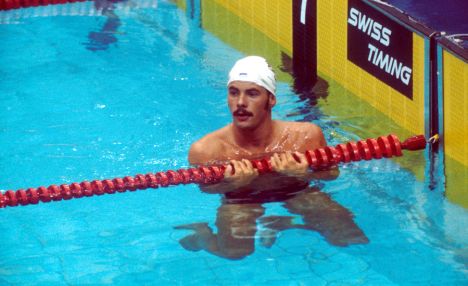With Wimbledon just around the corner and after my earlier post featuring 1970s Wimbledon icon Bjorn Borg I thought I'd post this cover of the Radio Times from Wimbledon 1977 featuring Sue Barker who was beaten in the semis by American Ann Kiyomura-Hayashi.

Hi there and welcome to Ado's Blog. I am obsessed with nostalgia, especially 1960s & 1970s nostalgia and I enjoy nothing more than reflecting on days and times that have sadly long since gone! So join me, as I take a nostalgic gander down Memory Lane and celebrate all things past and occasional present, both good and bad! (All images used that are copyrighted are copyrighted to their respective publishers and are only used here for review purposes.)
Thursday, 31 May 2012
Swimming for Gold - David Wilkie

David Wilkie MBE was born in Sri Lanka, the offspring of Scottish parents who were stationed in that country.
He was a pupil of Daniel Stewart's College in Edinburgh, and while a student there he joined the Warrender Baths Club, one of Scotland's most prestigious swimming and water polo clubs. It was there that he began to develop his specialist stroke, the breaststroke.
Wilkie first came to the public's attention when he won bronze in front of his home crowd in the 1970 Commonwealth Games in Edinburgh in the 200 metre breaststroke.
He wore a swim cap for that event during the commonwealth games, making him the first elite swimmer to wear one in a major competition.

Wilkie's world breakthrough came as a surprise to many when he won silver in the 200 m breaststroke at the Munich Olympics in 1972. He had acquired the reputation of avoiding hard work and not being sufficiently committed. However, it was clear from this performance that he had outstanding natural ability.
He trained hard in Florida, and his battle with Hencken was revisited again and again in various meets over the years. In that time Wilkie had won the World 200m breaststroke title in 1973, before breaking the world record and regaining the title in 1975. He also picked up two golds and one silver at the Commonwealth Games in Christchurch in 1974, and added the European title to his collection.
However, it was after several years of intensive training, at the University of Miami, that Wilkie's finest hour came. He won gold in the 200 metre breaststroke at the Montreal Olympics in 1976, in a world-record time and preventing an American Sweep of the Men's swimming gold medals. He later added a 100 metre silver medal to his collection. In 1977 he was appointed MBE.

According to the British Olympic coach Dave Haller, Hencken was always more likely to be stronger over 100m, as his rapid arm movements were more suited to a sprint race, while Wilkie’s longer, more rhythmic strokes meant he was fancied over the longer distance. As it turned out, it was honours even for the pair. Hencken, as expected, triumphed in the shorter race, squeezing Wilkie into second, earning the Scot his second Olympic silver medal.
But in the 200m, as the race edged towards the last of four laps in the 50m pool, there was only going to be one winner. Side by side in lanes three and four, Hencken led for the first 100m. Wilkie, with his now legendary white cap, goggles and moustache combo, (he was the first swimmer to wear a cap and goggle together in competitive racing) realised it was do-or-die time in his quest for a gold. In the remaining 100m, his stamina and power came through. He took the lead towards the end of lap 3, and coasted to victory in the final length, winning by more than two seconds, cementing his place his history as a Scottish Olympic Legend.
Subscribe to:
Comments (Atom)
